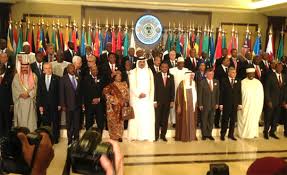The Arab League summit called on Wednesday for a political solution to the conflict in Syria and refused to recognize the Zionist entity as a “Jewish State”
The Arab League summit called on Wednesday for a political solution to the conflict in Syria and refused to recognize the Zionist entity as a “Jewish State”.
 The summit, which began on Tuesday in Bayan Palace in Kuwait, focused mainly on the Syrian crisis disregarding the Arab disagreements and giving only a little attention to the Palestinian cause.
The summit, which began on Tuesday in Bayan Palace in Kuwait, focused mainly on the Syrian crisis disregarding the Arab disagreements and giving only a little attention to the Palestinian cause.
The Arab leaders fully backed a Palestinian refusal to recognize ‘Israel’ as a “Jewish state”. "We express our total rejection of the call to consider Israel as a Jewish state," said the declaration.
On the Syrian issue, the leaders called in a statement at the end of a two-day summit for a “political solution to the crisis in Syria based on the Geneva I communique,” which includes a peaceful transition of power.
The communique was drawn up at an international conference in 2012 in the Swiss city without the participation of the Syrian government or the foreign-backed militants.
At the summit on Monday, Syria's so-called National Coalition chief Ahmed Jarba repeated calls on the international community to supply the foreign-backed opposition with "sophisticated weapons".
He wondered about the the reason that prevented the members of the Arab League from accepting the Syrian opposition as the representative of Syria in the Arab summit.
Secretary-General of the Arab League, Nabil Al-Arabi, said that the Syrian crisis led to disastrous effects on the region.
Kuwait Emir, Sabah Al-Ahmad Al-Jaber Al-Sabah warned about the continuation of that crisis, a stance that converged with the opinion of the U.N. peace mediator for Syria, Lakhdar Brahimi.
"I demand from all the members of the Arab League that they cooperate with Russia, the United States and the United Nations to take clear measures to re-energize Geneva II," Brahimi said. The military option would not end the Syrian crisis, Brahimi affirmed, demanding the stop of the weapon flow to Syria.
"We should take steps, according to the decisions of the Arab League and the national community, to end the Syrian crisis and achieve the aspirations of the Syian people," the Emir of Qatar, Tamim bin Hamad Al Thani, said.
As for Saudi Arabia, its Deputy Prime Minister wondered that Syria seat was not taken by Syrian opposition national coalition.
Lebanese President Michel Sleiman talked about the difficulties faced by Lebanon regarding the Syrian refugees and counterterrorism.
Finance Minister Ali Hassan Khalil, who was among the Lebanese delegation to the summit, announced on Tuesday that he withdrew from the meeting during Jarba's speech.
“I pulled out from the hall in harmony with my own convictions and allegiances,” Khalil, who is the political adviser of Speaker Nabih Berri, said via Twitter.
Arab disputes, which pit Qatar against Egypt, Saudi Arabia, Bahrain and the United Arab Emirates, broke out in the runup to the summit. Egyptian Foreign Minister Nabil Fahmi told reporters it was not possible to forge a compromise with Qatar during the summit because "the wound is too deep."
Kuwait's foreign ministry undersecretary Khaled al-Jarallah also said the dispute between Qatar and its neighbors would "be resolved within the Gulf house", not at the Arab summit.